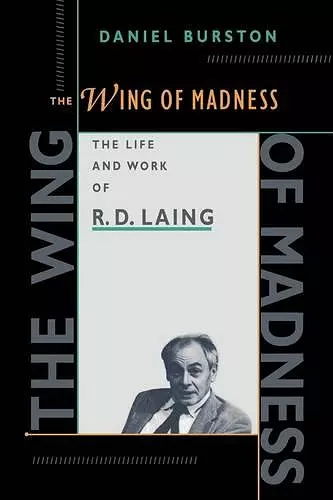The Wing of Madness
The Life and Work of R.D. Laing
Format:Paperback
Publisher:Harvard University Press
Published:12th Feb '98
Currently unavailable, and unfortunately no date known when it will be back

Daniel Burston chronicles Laing's meteoric rise to fame as one of the first media psychogurus of the century, and his spiraling decline in the late seventies and eighties. Here are the successes: Laing's emergence as a unique voice on the psychiatric scene with his first book, The Divided Self, in 1960; his forthright and articulate challenges to conventional wisdom on the origins, meaning, and treatment of mental disturbances; his pioneering work on the families of schizophrenics, Sanity, Madness and the Family (coauthored with A. Esterson). Here as well are Laing's more dubious moments, personal and professional, including the bizarre experiment with psychotic patients at Kingsley Hall. Burston traces many of Laing's controversial ideas and therapeutic innovations to a difficult childhood and adolescence in Glasgow and troubling experiences as an army doctor; he also offers a measured assessment of these ideas and techniques.
The R. D. Laing who emerges from these pages is a singular combination of skeptic and visionary, an original thinker whose profound contradictions have eclipsed the true merit of his work. In telling his story, Burston gives us an unforgettable portrait of an anguished human being and, in analyzing his work, recovers Laing's achievement for posterity.
This new biography is by far the best account of Laing's life and achievements that I have yet read. Daniel Burston is frank about Laing's many personal failings, but also has an impressive intellectual grasp of Laing's legacy to psychiatry. -- Anthony Storr * Boston Book Review *
[A] comprehensive and extraordinarily readable study of Laing's life and work. -- Perry Meisel * New York Times Book Review *
[Burston's] timely contribution is a superb intellectual biography whose breadth, balance and depth is not likely to be eclipsed soon...For Laing, the great question was: What is experience, after all? Daniel Burston certainly grasps the significance of this in Laing's life and work, and sets out to explore its intellectual implications in the rich legacy of his writings...Contemporary scholars sill appreciate his keen sense of what is still relevant in the Laing corpus. -- Charles Levin * Toronto Globe and Mail *
[An] important and timely study...Burston is intent first on mapping how Laing was able to turn his own background and psychiatric experience into an original philosophy of mind with far-reaching implications. Then he distills Laing's ideas from their milieu to set them in historical and critical perspective...Burston's biography reminds us that to ignore so inventive a thinker as Laing because of changes in fashion is to impoverish our knowledge of ourselves. -- Michael Vincent Miller * Boston Sunday Globe *
Burston's elegant account of [Laing's] early years has a measured thoughtfulness...The Wing of Madness is...[a] scholarly and articulate book. -- Harriet Stewart * The Guardian *
Burston makes a plea for judging Laing by his work and achievements. Since we do not condemn painters and scientists for personal indiscretions, why condemn psychiatrists?...This is a searching and critical, balanced and fascinating book, which I enjoyed reading and rereading. -- Rachael Chazan * Jerusalem Post *
[Burston] provides valuable insights into some of the reasons for Laing's fall from prominence. -- Richard Restak * Washington Times *
The strength of [the book's] combination, of biography and the summaries and reviews of psychological ideas, is that it helps us put the psychoanalytic project into its historical perspective. * Journal of the History of the Behavioral Sciences *
Burston admirably relates the genesis of Laing's ideas, assesses the extent to which they have stood the test of time, and describes Laing's colorful life in straightforward fashion. * Library Journal *
Burston...astutely analyzes [Laing's] view of psychotic breakdown as ontological crisis [and] selects significant biographical events that helped form Laing's ideas. * Publishers Weekly *
ISBN: 9780674953598
Dimensions: unknown
Weight: 354g
275 pages